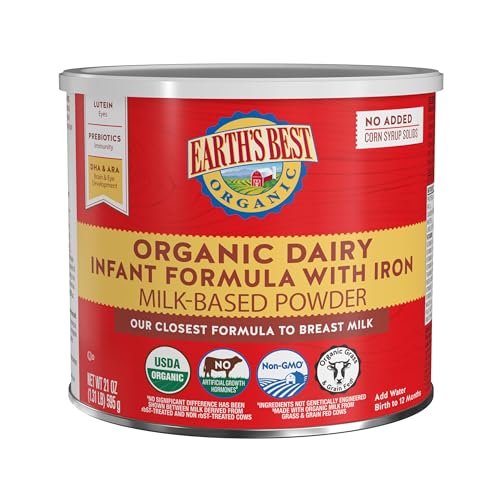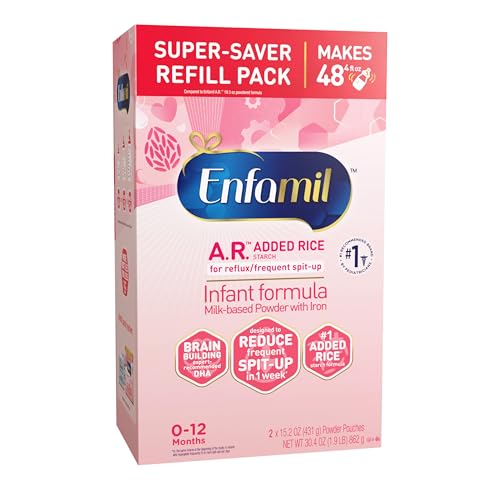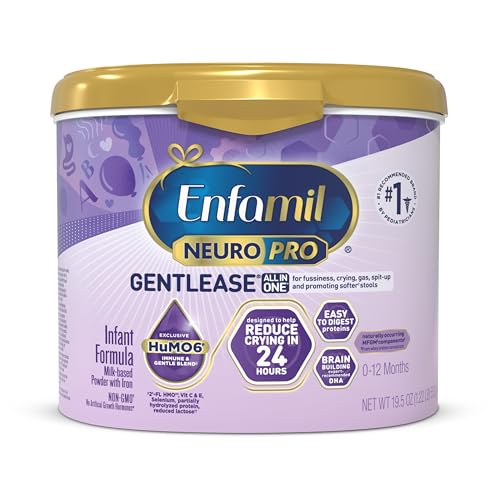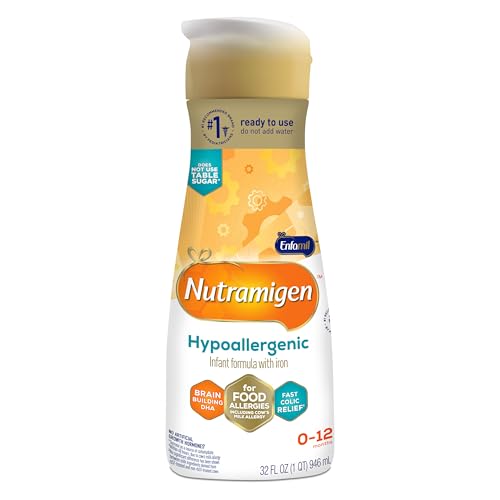From birth until the sixth month of life, a newborn’s primary source of nutrition is milk. While breastmilk is considered to be the most nutrient-rich option, there are various challenges that new mothers may face in their breastfeeding journey (1). Some may experience mastitis, while others may not have the necessary support from their partner. Additionally, all new mothers can attest to the struggles of lack of sleep during this time.
With a vast array of baby formulas available in the market, it can be challenging to determine which one is best suited for your baby’s specific needs. To make the task easier for you, it is crucial to understand the various types of formulas available, their ingredients, and the benefits they provide for your baby’s growth and development.
Whether you are looking for a formula that resembles breast milk, is hypoallergenic, or provides essential nutrients, we hope you can find one here that will work for you.
Our Top Picks
- Best Baby Formula Overall: Gerber Good Start Baby Formula Powder
- Best Organic Baby Formula: Earth’s Best Organic Baby Formula
- Best Baby Formula For Reflux: Enfamil A.R. Infant Formula
- Best Baby Formula For Sensitive Stomach: Enfamil NeuroPro Gentlease Baby Formula
- Best Baby Formula For Constipation: Enfamil Reguline Baby Formula
- Best Hypoallergenic Baby Formula: Enfamil Nutramigen Infant Formula
- Best Baby Formula Like Breastmilk: Happy Baby Organics Infant Formula
- Best Baby Formula For Allergies: Similac Alimentum
- Best Baby Formula For Preemies: Similac NeoSure Premature Post-Discharge Infant Formula
- Best European Baby Formula: Aptamil Gold+ ProNutra Biotik
In This Article
HappyBabyHub’s Best Baby Formulas Picks
Gerber Good Start Baby Formula Powder – Best Baby Formula Overall
- This formula has 30% lactose
- Good for sensitive bellies
- Helps with gas and constipation
- Suitable for colic
- Expensive
This formula is different from others as it contains probiotic L. reuteri and HMO, which are two essential ingredients that aid in supporting the digestive health and the growth of the immune system of infants.
Plus, this formula is also non-GMO and produced without the use of synthetic growth hormones. Additionally, the formula contains tiny, easily digestible Comfort Proteins, which are designed to help soothe the baby’s stomach and reduce any discomfort they may be feeling.
Earth’s Best Organic Baby Formula – Best Organic Baby Formula
- USDA certified
- Closely mimics breastmilk
- Great for spit-ups
- Prebiotics
- A bit bubbly when mixed
The organic milk used in this formula is sourced from cows that have never been given synthetic growth hormones and are fed a diet of grains and grass, which results in a high-quality and pure product.
It is important to note that while Earth’s Best is the most affordable organic formula available, it still costs more than traditional, non-organic options. Earth’s Best asserts that this formula is the closest to breast milk, as it is an all-lactose product and does not contain corn syrup or other carbohydrates.
Enfamil A.R. Infant Formula – Best Baby Formula For Reflux
- A good formula for spit-ups
- Reduces reflux
- Contains dha
- Has probiotics
- Not the best smell
This formula is created with rice starch, which has been clinically shown to reduce frequent spitting up by over 50% in just one week and meets the high standards set by the American Academy of Pediatrics for reducing reflux.
One of the key ingredients in Enfamil A.R. infant formula is DHA, which is an essential nutrient for promoting the healthy development of the brain and eyes. Plus, this gentle milk powder formula is made with high-quality milk, and every ingredient has been carefully selected to ensure that your baby receives only the best.
Enfamil NeuroPro Gentlease Baby Formula – Best Baby Formula For Sensitive Stomach
- Easy to digest
- Easy to mix
- Reduces gas within 24 hours
- This formula is really light on a baby’s tummy
- Expensive
This formula is designed to be gentle on sensitive stomachs with partially hydrolyzed proteins, making it easier to digest.
One of the unique features of Enfamil NeuroPro Gentlease is the inclusion of milk fat globule membrane (MFGM), which is a natural component of breastmilk and essential for brain formation and development. This ingredient is also added to some Enfamil products to aid with digestion and support the growing needs of your baby.
Although slightly more expensive than generic formulas, this product provides a safe and nourishing option for your baby’s growth and development.
Enfamil Reguline Baby Formula – Best Baby Formula For Constipation
- Contains prebiotics that helps with constipation
- Easy to digest
- Has iron and other nutrients
- Helps fussy babies
- May not work for all babies
This formula contains probiotics and easily digestible proteins to promote the development of soft, comfortable stools, and within a week of usage, Enfamil promises your baby’s pooping will become more comfortable.
The unique mixture of prebiotics in Enfamil Reguline Constipation formula helps with digestion and promotes a healthy digestive system. Despite the inclusion of iron, which can sometimes cause constipation in infants, this ingredient is still necessary for normal growth and development.
In addition to promoting a healthy digestive system, this formula also contains omega 3 DHA and choline to support brain development, prebiotics, vitamins to boost the immune system, and a total of 30 other nutrients to balance your baby’s diet.
Enfamil Nutramigen Infant Formula – Best Hypoallergenic Baby Formula
- Reliable baby formula
- Helps with colic
- Great for settling baby’s tummy
- Premixed
- Not the best taste
This formula combines both highly hydrolyzed protein and hypoallergenic protein to provide a comprehensive solution for infants who are allergic to cow’s milk protein in the standard formula.
These proteins are not only hypoallergenic, but also easy to digest and have been shown to improve digestive health, skin health, and immune system function in infants up to 18 months of age after just one week of use.
Moreover, Nutramigen is nutritionally balanced, lactose-free, and contains no added sugars, making it a suitable choice for infants with digestive sensitivities.
Happy Baby Organics Infant Formula – Best Baby Formula Like Breastmilk
- Organic and gluten-free
- Good with gas
- Helps with spit-ups
- Contains prebiotics and other nutrients
- Maybe a bit foamy
As parents, the phrase “fed is best” is an important belief to hold, and if you’re looking for a formula that mimics breast milk as closely as possible, Happy Baby Organic Infant Formula may be the answer you’ve been searching for.
This formula contains prebiotics and important vitamins and minerals, such as calcium, vitamin D, DHA, zinc, choline, and organic lactose, which are all found in breast milk. These ingredients are carefully selected to ensure that your baby receives all the necessary nutrients for healthy growth and development throughout their first year of life.
Additionally, Happy Baby Formula is non-GMO and does not contain corn syrup, making it a healthier alternative for your little one.
Similac Alimentum – Best Baby Formula For Allergies
- Great for sensitive stomachs
- Broken down proteins
- Hypoallergenic
- Great for babies allergic to milk and soy
- Smells bad
If your baby is showing signs of discomfort or distress, it is important to consider switching formulas, as they may be experiencing a more severe reaction to the cow’s milk protein in their current formula. Symptoms of a milk protein allergy can include severe pain, rashes, vomiting, and blood in the stool.
This formula has been clinically proven to relieve colic symptoms within 24 hours and is specifically designed for infants with a milk protein allergy. The protein source in Alimentum is casein hydrolysate, which is derived from cow’s milk but has been broken down into smaller, more easily digestible molecules for infants.
This formula also contains maize maltodextrin instead of lactose, which can exacerbate existing digestive issues, as well as 2′-FL HMO, a nutrient that supports the immune system and promotes gut health.
Similac NeoSure Premature Post-Discharge Infant Formula – Best Baby Formula For Preemies
- Recommended and used by hospitals for preemies and small babies
- Can be mixed into different concentrations
- The price is great
- No stomach or digestive problems
- Tends to clump in the bottle
With a focus on catch-up growth, Similac NeoSure provides a higher level of protein, vitamins, minerals, and calories compared to term infant formula.
The formula is rich in calcium and phosphorus to support the development of strong bones, and it is free from synthetic growth hormones. Additionally, the formula includes important nutrients such as DHA, lutein, and vitamin E to support brain and visual development, ensuring that preterm infants receive the nutrition they need to thrive.
Aptamil Gold+ ProNutra Biotik – Best European Baby Formula
- This formula dissolves nicely
- Great taste
- Helps with spit-ups
- The packaging is really nice
- Might cause constipation in some babies
This European formula is nutritionally balanced to support the growing requirements of infants from 0 to 12 months.
It is designed to provide a comprehensive range of essential vitamins and minerals that are similar to those found in breast milk. The formula includes prebiotics GOS and FOS, probiotic B. breve, DHA (Omega-3), vitamins C and D to support the immune system, as well as other essential nutrients that are crucial for your child’s overall health and growth.
Plus, Aptamil Gold+ 1 Infant Formula is formulated without the use of synthetic growth hormones, ensuring that your child is receiving only the highest-quality and safest nutrition possible.
How To Choose The Best Baby Formula?
- Nutritional Needs: Consider your baby’s nutritional requirements and choose a formula that provides the necessary vitamins, minerals, and other nutrients to support their growth and development.
- DHA/AA: Baby formulas typically have a low content of cholesterol and saturated fats and contain various types of unsaturated fats. Some formulas include the two polyunsaturated fatty acids commonly found in breast milk, arachidonic acid (AA) and docosahexaenoic acid (DHA) (2). Historically, these were not included in baby formulas as newborns have the ability to produce them from other fats already present in the formula.
- Allergies: If your baby has a known allergy to cow’s milk protein or lactose, look for a hypoallergenic formula.
- Organic: If you lead an organic and environmentally-friendly lifestyle, you may want to consider an organic formula that is made from natural and non-GMO ingredients.
- Form: When it comes to choosing the right form of baby formula, there are three main options: powder, liquid concentrate, and ready-to-feed liquid formula. Powdered formula is the most budget-friendly option. However, it requires measuring the correct amount of water before adding the powder and mixing it. On the other hand, the liquid concentrate formula is a bit more convenient and less messy. A ready-to-feed liquid formula is the most expensive option, but it’s also the most convenient and least messy. Simply open the bottle and feed your baby without any preparation. The American Academy of Pediatrics (AAP) notes that there is no one superior form, and the choice will depend on factors such as budget, usage, and convenience (3).
What Are The Different Types Of Baby Formula?
- Cow’s Milk-Based Formula: The most common type of formula, made from cow’s milk that has been modified to resemble breast milk (4).
- Soy-Based Formula: A vegetarian alternative for those who prefer not to use cow’s milk or for infants who have a cow’s milk allergy.
- Hypoallergenic Formula: This type of formula is specially designed for infants who have a milk protein allergy and contains proteins that have been broken down into smaller, less allergenic pieces.
- Organic Formula: Made from organic ingredients, including milk from cows raised on organic farms, and does not contain genetically modified organisms (GMOs).
- Special Formula: Special formulas may be required for premature infants or infants with specific health conditions.
What Are The Different Ingredients In Baby Formula?
Baby formula typically contains a mix of proteins, carbohydrates, fats, vitamins, minerals, and other nutrients that are essential for a baby’s growth and development. The main ingredients in baby formula are:
- Cow’s milk protein (such as whey and casein), soy protein, or hydrolyzed protein (in the case of hypoallergenic formulas)
- Carbohydrates, usually in the form of lactose or corn syrup solids
- Vegetable oils (such as palm olein, soy, coconut, or high oleic sunflower oil) as a source of fat
- Vitamin and mineral mix, which may include iron, calcium, vitamin C, B vitamins, and others
- Additional ingredients such as prebiotics, DHA and ARA, and other substances may also be included
Although some parents may consider using cow’s milk as a substitute for breast milk instead of formula, it is not recommended by the American Academy of Pediatrics (AAP) because cow’s milk can be hard for a baby’s digestive system to process and does not contain the same essential vitamin balance found in formula (5).
How Do You Switch Your Baby From Breast Milk To Baby Formula?
Switching your baby from breast milk to formula can be a gradual process that takes some time to adjust. Here are some steps to help with the transition:
- Start by reducing one breastfeeding session per day, and replace it with a bottle of formula. This can help your baby get used to the taste and texture of the formula.
- Start with small amounts of formula and gradually increase the amount. This can help your baby’s digestive system adjust to the new food source.
- Another option is to mix breast milk with the formula in the bottle. This will help your baby get used to the formula while still getting the benefits of breast milk.
- Consult with your pediatrician to choose the right formula for your baby. They can recommend the best formula based on your baby’s age, weight, and health.
- The transition from breast milk to formula can take time, so be patient with your baby and let them adjust at their own pace.
How Much Formula Should I Feed My Infant?
On average, newborns drink about 1-2 ounce of formula for the first week per feeding, 3-4 ounces during the first month and gradually increase the amount as they grow (6). It’s also important to pay attention to your baby’s hunger cues and adjust the amount accordingly.
What Type Of Formula Is Best For Breastfed Babies?
Cow’s milk is a common ingredient found in most standard baby formulas and is usually well-tolerated by breastfed infants. However, it is always best to consult with your pediatrician if you notice any signs of intolerance such as increased gas, constipation, or fussiness in your child.
How Do I Prepare Infant Formula?
- Wash your hands thoroughly with soap and water.
- Boil fresh water and let it cool to room temperature. You can use bottled water or tap water, but make sure it’s safe to drink.
- Fill a bottle with the recommended amount of water, which can vary based on the formula you’re using and your baby’s age. The instructions on the formula canister or label will provide you with specific amounts.
- Add the recommended number of scoops of formula to the water, using the scoop that comes with the formula.
When Do Babies Stop Drinking Formula?
Babies usually transition from formula to solid food at around 6 months of age, but they may continue to drink formula as a supplement to their diet until they are 1 year old or older (7). However, the exact timeline can vary from baby to baby and it’s important to consult with your pediatrician for personalized recommendations.
Can You Make Baby Formula?
No, it is not recommended to make your own baby formula at home as it can be unsafe and not nutritionally balanced for your baby. Commercial infant formula is regulated by the FDA and must meet strict standards for quality, safety, and nutrition (8). Making your own formula at home can expose your baby to harmful bacteria, contaminants, or imbalanced nutrients. It is always best to choose a commercially prepared infant formula from a trusted brand and follow the preparation instructions carefully.
What’s The Best Type Of Water To Use To Mix Powder Formula?
It is recommended to use distilled or sterile water to mix with the powder formula to minimize the risk of contamination. Tap water can contain impurities or minerals that can affect the taste and nutritional quality of the formula. If using tap water, it’s best to boil it first and let it cool to room temperature before mixing it.
How Can I Tell If My Baby Is Allergic To Formula?
You can tell if your baby is allergic to formula if they experience symptoms such as (9):
- Rash or hives
- Vomiting
- Diarrhea
- Abdominal pain or bloating
- Colic or excessive crying
- Breathing difficulties
- Coughing or wheezing










